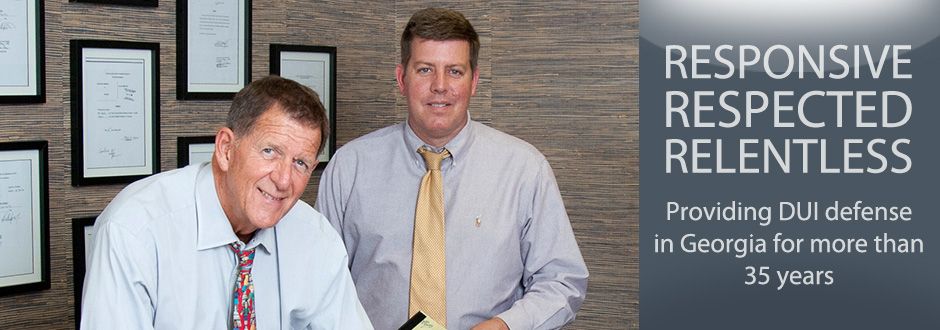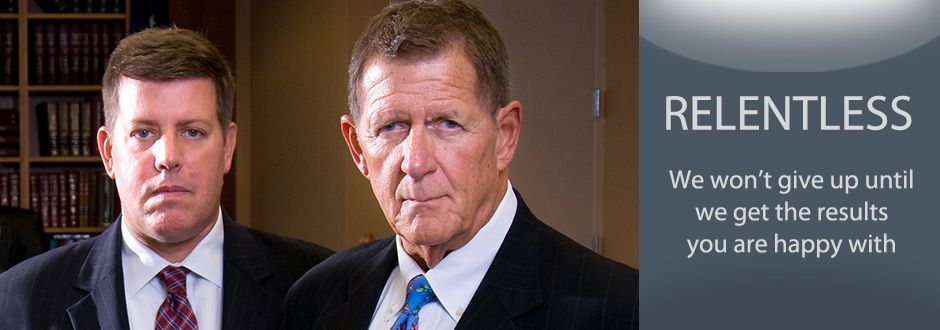
Tragedy often strikes when we least expect it. Traffic in Georgia can be unpredictable, and accidents can sometimes lead to horrible consequences, even if unintended. Grieving for the loss of a loved one, friend, or an individual who died as a result of an accident is traumatic in itself, only to be charged and arrested for vehicular homicide (Homicide by Vehicle). There are, on average, 1,500 vehicular homicide cases in Georgia alone each year (National Highway Traffic Safety Administration “NHTSA”). The Georgia Governor’s Office of Highway Safety reports similar figures, with about 300 traffic fatalities each year that are alcohol-related. Vehicular Homicide is the most severe criminal traffic offense in Georgia. If you or a loved one are facing these charges, our experienced vehicular homicide lawyers at Chestney & Sullivan can help prepare the best criminal defense possible.
Homicide by Vehicle is a serious charge that can bring serious consequences. If the charge rises to a felony, the penalty range can be three to fifteen years. Suppose the driver charged with vehicular homicide had already been declared a Habitual Violator. In that case, the driver can be sentenced from five to twenty years in prison – just on that one charge alone!
A Misdemeanor Homicide by Vehicle charge can carry a penalty of up to twelve months in jail and up to $1000 plus statutory add-on fees.
You can also have your Georgia driver’s license or privilege to drive in Georgia suspended for a minimum of 120 days if a misdemeanor, three years if a felony, and possibly more if the driver was already declared a Habitual Violator. No limited driving permit is available in Georgia during the suspension period if convicted of felony vehicular homicide. A trial court can order a condition of a sentence to suspend a driver’s license for part of or the entire term of a punishment in addition to any statutory license suspension.
Serious traffic charges like Vehicular Homicide require a serious defense:
Because the law for Homicide by Vehicle in Georgia can be tricky, it is critical to get started right away on an investigation to prepare a defense. Typically, an accident reconstructionist is hired quickly to investigate how the crash happened, survey and map out the location of the accident, and take pictures of the accident scene vehicles. Critical data needs to be downloaded from the “black box” (Event Data Recorder, or EDR) in the car before the vehicle is repaired or sent off to the salvage yard. There is likely video from a police investigation (in-car dash camera, body cameras), and many locations now have traffic cameras (still shots and video) that must be preserved as part of an investigation. The police may also bring in their accident reconstruction team to conduct their investigation, and they may obtain a search warrant for the “black box” from your vehicle. Georgia State Patrol also has a Specialized Collision Reconstruction Team (SCRT) that routinely brings out fatality accidents to investigate a crash. Law enforcement is also likely to get search warrants for your blood, where blood samples can be forcibly drawn from you and sent to the Georgia Bureau of Investigation (GBI) for testing. They can also get search warrants for your medical records if you received medical care from the accident.
Time is of the essence when preserving evidence for your defense, be it physical evidence of how the accident occurred, photographs of the scene and the vehicle, or photographs of injuries to our clients (cuts, bruises—that can become more visible over several days, etc.).
As our investigator gathers evidence, our experienced lawyers at Chestney & Sullivan review videos, photographs, crash data, police reports, toxicology reports, medical records, and statements to prepare defenses in your case. Properly researched and prepared motions are significant in attempting to exclude evidence that the prosecutor may use against you at trial. Using hearings such as probable cause hearings, administrative license suspension hearings, and pretrial motion hearings can help position a vehicular homicide case for better negotiations and success in motions or to improve our chances of getting a not-guilty verdict at trial. But an investigation must begin right away. Otherwise, critical evidence that may aid our defense may be forever lost. Call Chestney & Sullivan anytime at 404.816.8777. Typically, an attorney with our firm can speak with you 24 hours a day, including weekends and holidays.
The Bond Process for Vehicular Homicide:
Typically, a person arrested for Homicide by Vehicle will have to make an appearance in front of a magistrate judge to set a bond for release from jail while the criminal case is pending. Suppose you have a prior DUI arrest history. In that case, a court has the authority to deny the bond initially and let a superior court judge decide whether to grant the bond (or a state court judge if a misdemeanor is in a jurisdiction with a state court). We try to arrange for a substance abuse evaluator to visit our clients at the jail if no bond has been set. Having a substance abuse evaluation done and preparing a treatment plan may improve the chances for a court to grant a bond with conditions. Following a treatment plan may also be helpful for negotiations and mitigation of punishment if the case results in a plea or conviction. While in jail, a friendly reminder that ALL phone calls are recorded and monitored – meaning that what you say WILL be used against you and will most certainly aid the prosecution in building their case. Do not discuss the case with anyone over the phone; this includes financial information like bank and credit cards. The prosecutors can issue a subpoena or get search warrants for your financial data to find out where you were and what you had to drink (if you were consuming alcohol).
Expect phone calls from police investigators and private investigators (for civil lawsuits):
You can expect phone calls from police investigators and investigators from the prosecutor’s office. We generally tell our clients to let them know they are represented and refer them to our office. Our attorneys will assess whether talking to them is an excellent strategy—in most cases, it is not.
Expect phone calls from the news media and insurance companies:
The news media will attempt to call or show up at your residence. Please do not talk to them. They are not your friend. Let your attorney speak for you if the attorney decides to talk to them. Also, insurance companies will be contacting you to get your side of the story. These phone calls are recorded and can be subpoenaed by the police and the prosecution to be used against you. We generally tell our clients to direct those phone calls to us so we can better assess what information to disclose to them and what not to reveal.
What to tell your insurance?
As part of your policy agreement, you had a duty under the policy to cooperate with your insurance company. Again, suppose you discuss the facts of your case with your insurance company claim agent. That conversation is recorded in that case, and a prosecutor can subpoena your statements regarding the criminal case. We advise our clients to have the insurance company contact us. We will coordinate with them about statements. In significant instances in which a fatality is involved, the insurance company will assign a lawyer for you (that is part of what you pay car insurance for). Insurance companies often hire an outside civil law firm as your civil attorney for the inevitable civil lawsuit for monetary damages. We coordinate with those attorneys as settlement outcomes can impact negotiations or sentencing in the criminal case.
Do not reach out to the victim’s family (at least not right away):
The victim’s family will be grieving the death of their loved one. They will direct their anger toward you. You may also inadvertently make admissions that can be used against you in court. There will be a proper time to express your sorrow, but don’t express your grief or remorse to anyone until your attorney appropriately advises you.
Stay off social media:
Engaging on social media while pending criminal and civil cases is not a good idea. Stay off Facebook, Twitter, etc. It is probably best to suspend or shut down your social media accounts. Prosecutors (and civil attorneys) can subpoena social media companies for the media content of your accounts.
Penalties for Homicide by Vehicle:
Depending on whether the charge is a misdemeanor or felony, the Georgia Statutes define what penalty a person charged with vehicular homicide could receive.
The Georgia code section (statute) reads as follows:
§ 40-6-393. Homicide by vehicle
(a) Any person who, without malice aforethought, causes the death of another person through the violation of subsection (a) of Code Section 40-6-163 (Passing a School Bus), Code Section 40-6-390 (Reckless Driving) or 40-6-391 (DUI), or subsection (a) of Code Section 40-6-395 (Fleeing or Attempting to Elude) commits the offense of homicide by vehicle in the first degree and, upon conviction thereof, shall be punished by imprisonment for not less than three years nor more than 15 years.
(b) Any driver of a motor vehicle who, without malice aforethought, causes an accident that causes the death of another person and leaves the scene of the accident in violation of subsection (b) of Code Section 40-6-270 (Hit and Run) commits the offense of homicide by vehicle in the first degree and, upon conviction thereof, shall be punished by imprisonment for not less than three years nor more than 15 years.
(c) Any person who causes the death of another person, without an intention to do so, by violating any provision of this title other than subsection (a) of Code Section 40-6-163 (Passing a School Bus), subsection (b) of Code Section 40-6-270 (Hit and Run), Code Section 40-6-390 (Reckless Driving) or 40-6-391 (DUI), or subsection (a) of Code Section 40-6-395 (Fleeing or Attempting to Elude) commits the offense of homicide by vehicle in the second degree when such violation is the cause of said death and, upon conviction thereof, shall be punished as provided in Code Section 17-10-3 (statute outlining the penalties for general misdemeanors, punishment of up to twelve months in jail and $1000 fine).
(d) Any person who, after being declared a habitual violator as determined under Code Section 40-5-58 (Habitual Violator statute) and while such person’s license is in revocation, causes the death of another person, without malice aforethought, by operation of a motor vehicle, commits the offense of homicide by vehicle in the first degree and, upon conviction thereof, shall be punished by imprisonment for not less than five years nor more than 20 years, and adjudication of guilt or imposition of such sentence for a person so convicted may be suspended, probated, deferred, or withheld but only after such person shall have served at least one year in the prison.
GA. Code 40-6-393 Homicide by vehicle (Georgia Code (2019 Edition))
Do not wait to call our experienced Vehicular Homicide lawyers:
If you or a loved one have been charged with Homicide by Vehicle, call the experienced defense lawyers at Chestney & Sullivan right away. We are available 24 hours a day, including weekends and holidays. Call us now at 404.816.8777.







